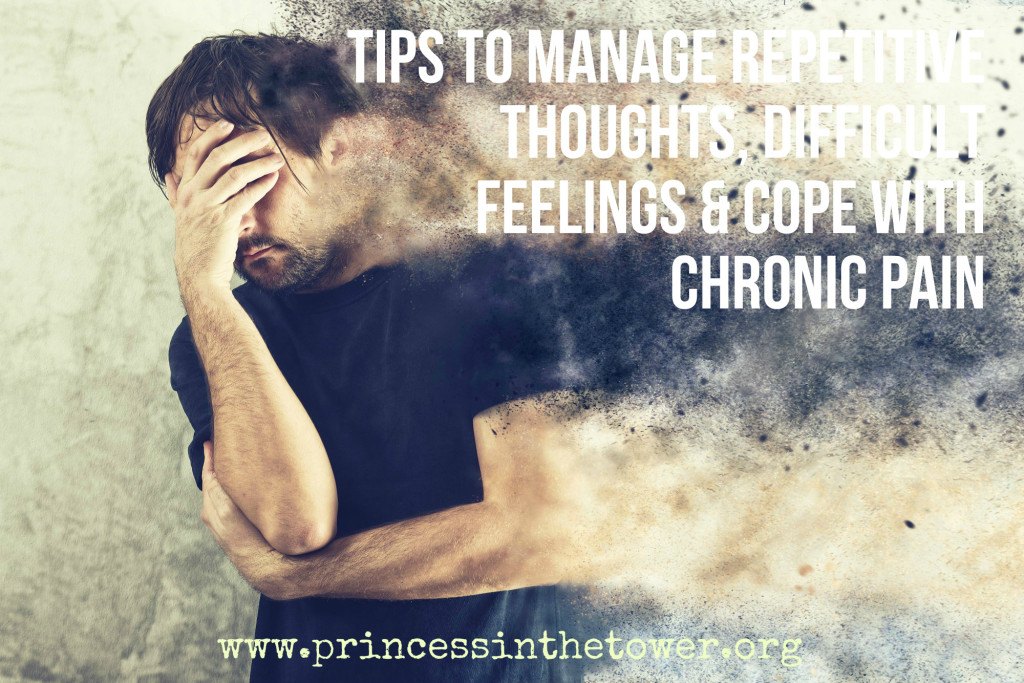When you have chronic pain, it’s natural to struggle with unhelpful & repetitive thinking. Move from a place of struggle & sadness to one of coping with these tools & tips.
When our whole world has been tipped on its own axis by a perplexing pain condition, it’s natural to feel frustrated and filled with uncertainty, even fearful and depressed, more so to struggle with unhelpful thinking. Just as our symptoms are ceaseless, our thoughts too can be as restless and turbulent as the roughest seas.
We may have far more negative automatic thoughts about ourselves, our pain, and the future, especially when the pain increases or if immobilised by a flare-up. When we’re physically stuck it can also stagnate our thinking processes, as if the volume on all those thoughts is turned up. Our minds may get caught in a loop, offering ceaseless ‘evidence’ that all is truly lost.
These thoughts can understandably swiftly worsen the entire experience of living with pain, especially your ability to manage it and cope. Even if right now it seems impossible, liberating yourself from this can happen. Although seeing a pain psychologist may not be an option, physically or financially, learning a few simple psychology techniques can truly help you cope.
Beyond Physical Pain

When you live in pain you know that it is far more than the physical symptoms. You know what it is to live with the unpredictability, with the uncertainty, with the scuppered plans, grieving and losses.
You know what it is to miss out on the simplest blessings, to long to do so much more, and the consequences of overextending yourself and flaring-up when you do. Constant pain makes it hard to concentrate and think. It saps energy and can be exhausting simply getting through the day.
The invisible nature of pain adds an additional difficult dimension, with disbelief of that pain being another challenge. All these things have psychological implications. You may understandably struggle with unhelpful thoughts, feel depressed, frustrated, fearful, and longing for even the briefest of breaks.
The Pain Experience
Pain cannot be separated from our emotions any more than the ‘pain experience’ can be considered to be exclusively a physical problem. Even those closest to us tend to think it’s all about the physical pain but no part of life is left untouched by chronic pain.
“We know that our thoughts and emotions can influence the perception of pain, making it much worse or less intense,” says Beverly Thorn, Ph.D, Clinical Health Psychology Professor and author of Cognitive Therapy for Chronic Pain: A Step-by-Step Guide.
The need for psychological tools to help ease the unhelpful thinking, negative thoughts and depression, and shift these thoughts into more nourishing places by changing your automatic reactions into healthier, more nourishing responses becomes an essential part of coping.
Repetitive Thoughts

“Typically people may have thoughts like: “I am useless”, (a negative thought about the self), “nobody cares”, (a negative thought about the world), or “theres no point”, (a negative thought about the future). Not surprisingly, these negative thoughts lead to reduction in mood and the more low you are in mood the more of these thoughts you get,” says clinical psychologist, Damian Gardner.
“The whole process is compounded by the role of memory since when people are low in mood they spontaneously recall more aversive memories. Typically the cycle of mood and thoughts then impacts on activity, relationships and choices. Over time day-to-day thoughts can lead to changes in our long term beliefs about ourselves and the world and others.”
One technique from CBT involves writing down a negative thought on one side of a card. On the other side, write a rational response to that thought, a coping statement. Reach for the card(s) whenever you are struggling with the rabbit hole of difficult feelings and thoughts.
When Thoughts Turn to Beliefs
When repetitive thoughts turn to beliefs we reinforce them each time they come up, making it even more difficult to break free from this difficult and depressing pattern. “These then underpin the availability of even more aversive thoughts on a day to day basis,” says clinical psychologist, Damian Gardner.
“One example of this would be the very powerful thought of feeling helpless and unable to influence ones life ‘nothing I do can make a difference’. Over repeated months and years the “habit” of thinking “whats the point” and “nothing helps” may become entrenched with the overriding belief that one is helpless to change ones situation.”
Beverly Thorn agrees: “Thoughts like “This pain has ruined my life, and there’s nothing left to be done,” negatively affect your emotions and behaviours. They also make you more likely to get depressed and withdraw. If you feel like there’s nothing you can do, you won’t do anything, which is really dangerous for someone with chronic pain.” Damian Gardner says that there are three typical patterns of thinking in chronic pain patients:
- Hopeless thoughts, eg “there is no point” leads to depressed mood and potentially to despair.
- Self-attack thoughts, including the idea of not being socially acceptable, lead to the emotion of shame.
- “Should” thoughts often lead to making unnecessary choices or judgements about ones own behaviour or others and thoughts about anticipated adversity lead to increased anxiety and avoidance situations.
Outside Stresses
With there often being no outward signs of anything wrong and our symptoms being as invisible and perplexing to us as they are to our loved-ones, we face the added psychological stress of having to deal with everything from proving our pain to answering ridiculous questions about our chronic illness.
A single deceptive act on a ‘better’ day might result in being asked if things are ‘all better now’, which is both frustrating and disheartening. With the uncomfortable knowledge that this truly is our reality, the reminder of this, whether through an ignorant question — even if from a compassionate place — or a dismissive remark, it adds to the psychological challenges of chronic illness and pain.
Remember that the reactions and judgements of others are often more about them than you, and that it’s your choice if you want to educate them on the reality of your condition or not. One tool that is useful in this circumstance is to use the breath. Deep, nourishing breathing can be helpful when you need to release an let go of outside stress, with the added benefit of longer exhalations activating the parasympathetic wing of your nervous system and calming your internal state, and your pain.
Hiding Our Feelings
Of course, we are frequently as adept at hiding this state of internal stress as we are the chronic pain. It’s like being behind a window, silent and painful, something only you are aware of. When you are always in a state of concealing your pain — because exhibiting the true severity neither helps us, the pain, or our relations with others — that can filter into your emotions too.
This makes us express our true feelings less and less but the more we bottle up and hide the depth of our grief for our life un-lived or the ongoing feelings and challenges of living with severe pain, the worse the effect is on our psychological wellbeing, and in turn our physical symptoms and pain. It’s a loop but one you can liberate yourself from.
Shift Your Focus
Even if pinned to the bed in a flare-up or in a different kind of internal prison, we do have the final choice in where we put our focus. As Viktor E. Frankl, concentration camp survivor and author of the amazing book, Man’s Search for Meaning once said, “Everything can be taken from a man but one thing: the last of the human freedoms—to choose one’s attitude in any given set of circumstances, to choose one’s own way.”
Shifting where you choose to put your attention is key but it is a process too. Never berate yourself if you find yourself caught in a loop of unhelpful thinking because self-compassion through chronic pain and illness is an essential part of coping: you have to be on your own side, and be kind to yourself. Pain is hard enough.
Responding Skilfully to Difficult Thoughts
Despite what advocates of the positive thinking movement would have you believe –you do not have full control over your thoughts. Trying to control the thoughts that appear can end up frustrating you instead of helping you.
Instead, reframing the thoughts, and testing them for truth, is a huge part of pain psychology and a useful coping strategy. Responding skilfully helps you stop a stressful thought from turning into a negative spiral and depression. We are also frequently self-critical when these thoughts arise.
Pain psychologists work with patients to reframe some of the negative thoughts surrounding their pain and by learning a few of the same techniques, you can reframe the thoughts that only serve to distress, ultimately helping you cope without travelling down those metaphorical roads.
Allow Yourself to Feel What You Feel
Pain and loss can create tension in our inner landscape. Darken it, and in that darkness we can easily lose our way. Do allow yourself to feel what you feel. I think it’s counterproductive when we’re advised to think positively at all times. You need to express your feelings too. Obviously dwelling or relentlessly focusing on that is a different kind of counterproductive but you’ve been through so much. Give yourself permission to feel what you feel.
It’s entirely human to be sad about the things that you’ve lost. Express these difficult feelings through art, writing, or anything that takes you out of yourself — releasing these feelings in healthy ways — is healing and beneficial for your emotional state, and therefore your ability to live well and cope in spite of pain. Journalling can be healing, as can talking with loved-ones, whether online or in person.
Paying Attention to Self-Talk When Pain Increases
Paying attention to your thoughts is especially helpful when your pain level rises. “As soon as someone has an empowering thought, they start to feel like they have a little bit more control over their life,” says Beverly Thorn, who suggests asking yourself:
“What just went through my mind? What am I saying to myself?””If you are aware of a negative, unhelpful thought that’s emotionally difficult, “stop, breathe and then consider your options.”
This interrupts your automatic reactions, such as starting a cycle of repetitive, unhelpful thoughts, and creates distance, offering you another path, a moment between what’s automatic and what’s healing and helpful. “It reminds you that you have more control than you think you do,” adds Thorn.
Mind, Body and Brain Benefits of CBT
The finest advice of all for healing depression is exercise and getting outside in nature but that can scarcely help those who are housebound, or with such pain, that anything beyond the necessary physical therapy is the grandest of challenges. Instead, to pull yourself out of that place, Cognitive behavioural therapy (CBT) is an especially useful tool as it can stop those thoughts in their tracks, benefit your brain, and actually alleviate some of the pain.

CBT enhances your ability to cope by freeing you of the repetitive thoughts that mar your internal landscape. The losses, what ifs, the endless questions, fears, anxieties, past hurts and anger, all of which can be magnified by pain. Through identifying and changing negative thought patterns you can lessen harmful thinking.
CBT also can help rewire the maladaptive neuroplasticity that occurs in CRPS, fibromyalgia and longterm chronic pain. A study reported in The Journal of Pain found evidence that psychotherapy for chronic pain—in particular, cognitive behavioural therapy (CBT)—can also produce measurable changes in cerebral gray matter volume and density that correlate with patients’ improvement.
Create a List of Coping Thoughts
Try creating a list of coping thoughts relevant to situations you are having particular difficulty dealing with. This helps you to change the pattern, and be aware of the automatic thoughts that so frequently appear in response to a life spent in pain, in turn helping you adopt positive ways of coping.
For example, during a flare-up I often think of the useful inner mantra ‘this will pass’ or ‘I have coped before and am coping again’, gentle reminders that help you get through the flare, though every situation when living with a complicated pain condition can give rise to uncomfortable and difficult feelings, find what works for you.
Coping thoughts are a part of cognitive-behavioural therapy, and can help you change the way you think about the pain so that you can respond better to difficult feelings and thoughts, especially when the pain increases, such with flare-ups or breakthrough pain.
Try Using Byron Katie’s four questions
I first read about this practice in Toni Bernhard’s brilliant book, How to Be Sick. It’s a technique developed by Byron Katie. She calls it “inquiry” or “four questions and a turnaround.” Ask yourself these questions when you notice that your thoughts are bringing you down more than usual or you feel caught in the net of a stressful thought. Here are Byron Katie’s four questions:
1. Is the thought true?
2. Am I absolutely sure that it’s true?
3. How do I feel when I think the thought?
4. Who would I be without the thought?
Self-Compassion & Finding Hope
When pain is relentless and the challenges of chronic illness relentless too, it is easy to feel that everything is hopeless but this sets off a spiral of negative and repetitive thinking that makes coping with pain and illness all the more difficult.
Engaging with thoughts of hopelessness or other distressing, frightening, or frustrating thinking only makes you feel worse, and if you feel worse, you are less able to cope as effectively, much less manage your pain.
Even if your diagnosis, experience and knowledge betrays hope, the more you believe these catastrophic thoughts, the more anxiety you’ll feel, and the more your pain increases, making everything harder.
Instead nourish your internal state by focusing on where you are now, and building from this place, gently, self-compassionately, and kindly, using these techniques and those herein. Even though you live with pain; even if every morning you wake unsure if you can do this, even though your body burns, freezes, spasms, cramps and winces, always choose to be kind to yourself.
Having the self-compassion for yourself for things you can’t change, and nurturing yourself in ways that you can, helps you move from a place of struggle and sadness to one of coping, even living well in spite of your pain. Using psychological tools to help ease the unhelpful thinking, negative thoughts and depression that so frequently come with pain can create a shift to more nourishing places.
If you are finding it hard to cope and feeling depressed, reach out to support groups, online friends, social networks and know you are not alone in this. There are silver linings, no matter how frail. Visit this post to learn How to Use Pain Psychology Techniques to Reduce Anxiety, Depression, Anger and Guilt (a PDF extended version of this will go out in the May Princess Post newsletter). There’s also more on the pain management page.
For a free guide to CBT for chronic pain in, sign-up to the newsletter as I’ll be sending out just that in next month’s Princess Post. ♥
Managing Chronic Pain: A Cognitive-Behavioral Therapy Approach
Using Psychology to Cope With Chronic Pain
Coping with Pain: Catastrophic Thinking Makes Pain Worse
Cognitive Behavioral Therapy Changes Gray Matter Morphology in Chronic Pain | Pain Research Forum
When your brain helps the pain: Cognitive therapy in action
Do you use psychology techniques to help you cope with pain? What helps you? Add your thoughts in the comments below.
Feel free to share the love, thank you ♥
[avatar user=”jomalby” size=”thumbnail” /]










I have dealt with chronic pain for the last few years and it has been one of the hardest things I have ever had to deal with. I completely agree with you when you say that outside stresses can definitely be a cause and a trigger. When I am in the most pain, it is usually because I am stressed out about something at work or with my family. I will try to remember these tips for the future, thanks for sharing!
You’re welcome, Jessy, really pleased it’s useful for you. Chronic pain is so deeply affected by how we feel, and stress in particular has been found to have marked effects on it (not that we needed science to confirm this!). The experience of pain is so much more than the physical, and managing stress so crucial, as you say, it truly does make the pain skyrocket. I hope the tips help, and that you continue to enjoy the posts. 🙂 Gentle hug ♥ x
I come to your writing whenever I am struggling and your compassion, thoughtfulness and wisdom never fails to calm, motivate and comfort me. Thank you.
Thank you, Jessie. Your words mean so much. It’s been quite the struggle this year though to know it helps makes it worth each and every spoon. Wishing you continued calm and comfort, strength and self-compassion too, and far kinder days ahead. ♥ x
I am so thankful, that I found your site. I so far, haven’t found support groups for chronic pain in the state where I live; to say the lease, I am so disappointed.. I then found your site, and I am feeling so much relief to know that people understand. It’s almost as if you were speaking my words in some of the postings that I have read. I have hypothyroid and now have neuropathy because of that. I have arthritis, and Cervical Degenerative Disc disease so pain and I are twins lol. Thank you a thousand times and God be with you too for all that you do and share for us..
Thank you, Patti, for your lovely comment. So glad the posts have resonated with you. ❤️ You’re not alone, though I know in our pain experience it can so often feel that way and sometimes just knowing that can help us feel less isolated. Wishing you far more ‘better’ days than bad, blessings and gentle hugs ❤️ x